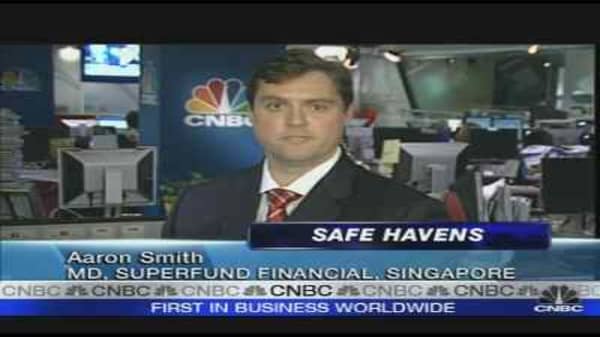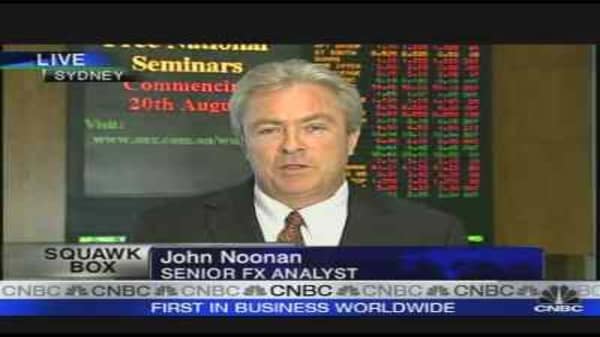After the rollercoaster ride that took place in the markets Wednesday – following the much desired global coordinated rate cut -- Asian and European markets rebounded Thursday.
But with uncertainty prevailing in these volatile markets, where can investors seek refuge? One common answer has been in gold and cash. Here's what the experts have to say:
Betting on Gold
Invest in gold as it may hit $2,000 a troy ounce in the next 6 months, advises Donald Luskin, CIO of Trend Macrolytics.
"Stores of value, long-term stores bedrock of value, like gold, are going to be the best performing assets over the next couple of years," Luskin said.
"Bet on inflation. Bet on inflation. Bet on inflation. It's the only way to protect yourself," Luskin added.
Hold a Chunk of Gold
"Gold is certainly the safe-haven choice right now…It's a great opportunity at $900 an ounce. It's actually really cheap. We expect it could easily go above $1,000 an ounce by the end of the year" Aaron Smith, MD of Superfund Financial said, adding that other precious metals like silver are also good investments.
"One of the safest things to buy today would be oil," Smith told CNBC.
No Teddy Bears' Picnic
Between October 8 and October 10 is a key time for making a low in the market, according to Tom Hougaard, chief market strategist at City Index, adding that we are likely to be in a bear market until 2011.
"We're looking at two years of negative growth for the UK, for the U.S. and Europe from here," Ian Harnett, European strategist at Absolute Strategy Research said, adding that stock markets have not priced in these declines.
Support Your Local Currency
The next stage of the turmoil will be in asset prices, which will fall sharply as assets are sold to raise cash, according to Graeme Maxton, chief economist at The Insight Bureau.
"To me, the best thing to be in at this stage, until I see anything different, is cash," Maxton told CNBC. "Stay in the currency in which you need to spend."
Finding Value Down Under
With such sharp moves being seen in the forex markets, Ashley Davies, FX strategist at UBS, believes the best way investors can protect their wealth is through low volatility currency baskets. His top pick? Fifty percent in the Australian dollar and fifty percent in the yen.
"If you have a basket of half Australian dollar and half Japanese yen, you're effectively taking out the element of risk aversion because the yen will appreciate when things are going bad and the Aussie will weaken. And these will offset each other," Davies said.
No More Carry Trade?
Currency market participants need to into safe havens as the carry trade is dead, said John Noonan, senior FX analyst at Thomson Reuters.
"There will be no carry trade for a while. Not until the credit markets start to loosen up again. Not until the fear factor that is driving all the markets goes away, and that doesn't look like happening anytime soon. If you try and pick a bottom in some of these currencies that were the beneficiaries of carry trades over the past couple of years, you're going to get hurt," Noonan told CNBC.
Cash Still Stable?
"The selloff recently has been more of a driver of getting into cash because the futures markets are liquid," Greg Smith, managing director at Global Commodities said.
Tech - The Final Frontier?
"The rest of the world has too much debt. The one advantage the tech sector does have is it has no debt. It's the only sector globally that has capital net cash, and so it doesn't have this negative financial leverage that everybody else does. So, I think near-term everything's going to be in trouble, the earnings season is going to be dreadful. This quarter on guidance is going to be dreadful as well. But I think we may start seeing a basing process in the tech sector within the next 6 months," Stuart O'Gorman, director of technology investment at Henderson Global Investors.
Taiwanese and Japanese tech companies are most vulnerable because of their high fixed costs, according to O'Gorman.
Recurring revenue companies like Oracle are safe places to hide, as well as tech companies with clean balance sheets, O'Gorman suggests.






